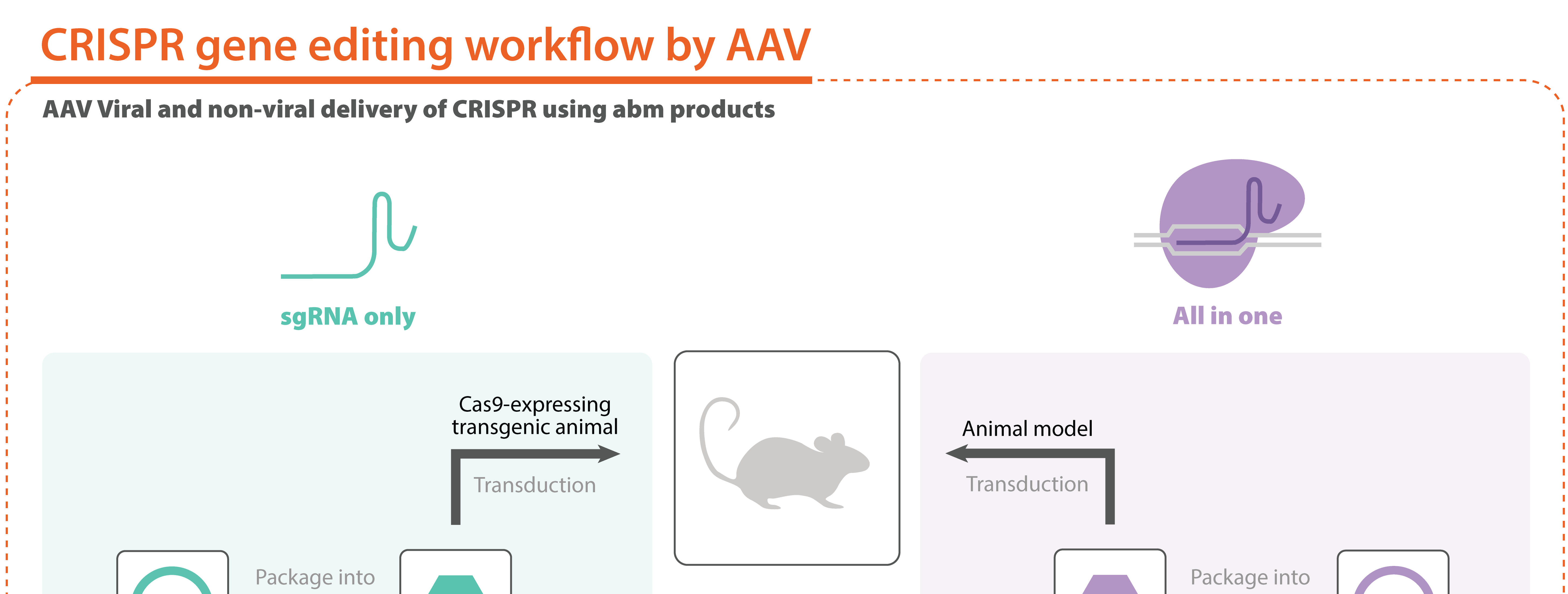CRISPR Gene Knockout AAV Library
abm's CRISPR Gene Knockout sgRNA AAV Vectors and Viruses have a broad host range and low immunogenicity - ideal for in vivo CRISPR experiments as they do not integrate into the host genome. spCas9 or saCas9 functions to create double-stranded breaks within an early exon triggering repair via Non-Homologous End Joining (NHEJ) mechanism resulting in deleterious frameshift mutations. We offer a comprehensive collection of All-in-One and sgRNA only expressing AAV constructs targeting any human, mouse or rat gene. Simply input your target gene or accession number into the search bar below.
Key Features
- Comprehensive collection of gene knockout sgRNAs
- Targets include all coding human, mouse and rat genes
- Available in All-in-One (with saCas9) or sgRNA only constructs
- Available in a set of 3 sgRNA vectors/viruses for added assurance of successful gene knockout
- Available AAV serotypes 1 to 11 for high transduction efficiency in specific tissues
- AAV delivery for low immunogenicity and non-integrating expression of sgRNA and/or saCas9
Looking for constructs expressing multiple sgRNAs? Check out our Custom Multiplex sgRNA Service.
Popular Products
- AAV Virus Titration Kit
- Screen It™ CRISPR Cas9 Cleavage Detection Kit
- CRISPR Scrambled Controls
- Custom CRISPR sgRNA AAV Vectors & Viruses
Search Gene Knockout sgRNA AAV Library
Knockout sgRNA AAV Library
We offer All-in-One and sgRNA only AAV vector/viruses for knockout of any human, mouse, or rat gene.
Can’t find what you’re looking for? Request a custom CRISPR sgRNA vector or virus with technical@abmgood.com.
Additional Information
Documents
Top Publications
Regulation of NKT cell-mediated immune responses to tumours and liver inflammation by mitochondrial PGAM5-Drp1 signalling.
Kang, Y J et al.
Nat. Commun. 6:8371 (2015).
DOI: 10.1038/ncomms9371.
Leukocyte cell-derived chemotaxin 2 is an antiviral regulator acting through the proto-oncogene MET.
Shirasaki, T. et al.
Nature Communications. (2022).
doi: 10.1038/s41467-022-30879-3
Clinical significance of SNORA42 as an oncogene and a prognostic biomarker in colorectal cancer.
Okugawa, Y et al.
Gut (2015)
doi:10.1136/gutjnl-2015-309359




